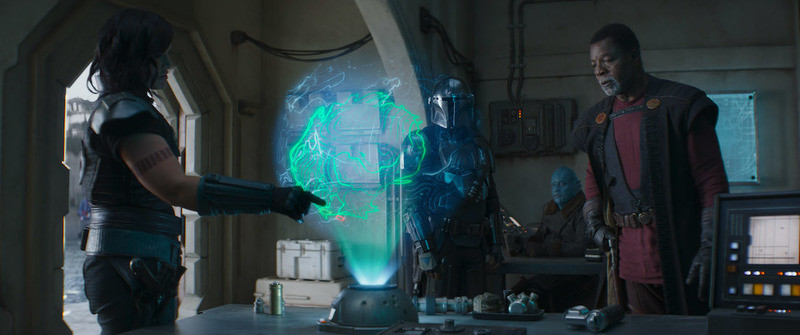
The 12th chapter of “The Mandalorian” begins with, you guessed it, a detour. What else can you expect for a show that wants to be busy but also do its world-building and plot development in increments? At least this pit-stop back to square one comes with old friends Greef Karga (Carl Weathers) and Cara Dune (Gina Carano)—characters with backstories to fill, and who we’ve been waiting to see for three episodes after their valiant work in the finale of season one. But this feels like a rushed reunion, and one might even call it trivial if the second half weren’t so exciting.
Before we get back to the planet of Nevarro, we have some primo Baby Yoda action. The Razor Crest was turned into a certified jalopy in the last episode, “Chapter 11: The Heiress,” and now our hero Din Djarin (Pedro Pascal) has to rely on Baby Yoda’s tiny body and hands to fix some wiring in a compartment Din couldn't even fit his helmet through. It doesn’t go so well, but it is funny, especially as another disarming moment for a recently-revealed religious zealot who never takes his armor off.
Nevarro has changed since we last saw it, thanks to Cara Dune acting as its butt-kicking Marshal, and Greef Karga taking on a more honorable role of helping lead the community with clerical work. They’ve proven that self-sufficient communities exist in these trying times, far from the patrolling of the X-wing cops. They even have a school for the young ones, which Mando is surprised about, and promptly places Baby Yoda in.
One more thing about Baby Yoda—sometimes the show seems interested in giving him a deeper sense of consciousness, and then it pivots away. It happened with his morbid fascination of eating Frog Lady's last remaining eggs in "Chapter 10: The Passenger," and now it's about his place in this confusing galaxy. In a brief, warming moment at the school, "The Mandalorian" makes you think it might go into how he’s isolated, especially as a little green thing who stands out among others and seems to have the most fun eating. There are some real opportunities here to make adorable relatable, but the story plays them off as slight. Isn't Baby Yoda kind of lonely, aside from hanging with his father figure?

Fixing up a ship takes up time, and Greef Karga jumps on Mando’s waiting period to give him another task. There’s an Imperial base on the outer rim of Nevarro that needs to be destroyed, especially if the planet wants to prosper as a popular trading destination. The plan is to go in there and destroy it, along with whatever Imperial holdouts are still there. Greef and Cara assume it’s going to be pretty easy, and even tell their driver Mythrol (Horatio Sanz) to keep the landspeeder running. Once they get inside, it becomes far more dire than that, and leads to a disturbing reveal about just what kind of base this place is.
While director Carl Weathers keeps the episode constantly in motion, it's an episode that makes you feel more of the show’s episode length, especially when it comes to characters. Even though we’ve been waiting to see Cara and Greef again since the last season, the most charisma is doled out to Mythrol, a character we first met in the pilot before The Mandalorian collected him and froze him in carbonite. He gets to have the comic relief, and some of the focus.
Our other characters, well, they don’t get much time to show their personalities, and the backstories that we’ve been curious about don't come to light. It’s more about putting them back on screen again, letting them star in Stormtrooper shootout clip shows with intermittent jogging, and maybe giving them a gruff one-liner or two. But your notion of these characters hardly changes, and it’s almost like you wish the series slowed down for a second to let them talk more, to give them a moment. Sure, it would add on a few more minutes, but it would ground them, and the show, more.
But what the episode lacks in character development, it makes up for in a chase scene in the third act that ranks among the entire series’ best action scenes. Some of it relies on old-fashioned “Star Wars” dogfighting thrills (like our heroes manning guns separate from the cockpit, locking onto targets) but it also mixes in some exciting dynamics of land craft battling aircraft. There are some particularly exciting shots of two aircrafts flying toward each other, dramatic and epic just like we want "Star Wars" to be. When composer Ludwig Göransson’s triumphant "Mandalorian" motif kicks in later on, it feels extra triumphant.
As the show's main writer, Jon Favreau does throw a couple juicy teases into "The Siege" as well, about what’s really going on with the Imperial holdouts that have appeared in earlier episodes. But in the scope of this series, that’s the closest we get to the overall plot advancing. "The Mandalorian" lurches forward with its mission of learning about where to find Baby Yoda's own kind, picks up speed, and then it has to take care of something else. It’s Favreau’s conservative world-building, but it comes at the expense of time with the living beings who make the show compelling beyond its more inventive action scenes and "WTF!" teases. Last week’s “Chapter 11: The Heiress” was better at giving a vivid sense of what came before, and what is to come, but this second season feels like it’s still stuck in the first act.
Nick Allen is the Senior Editor at RogerEbert.com and a member of the Chicago Film Critics Association.





